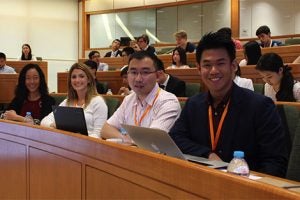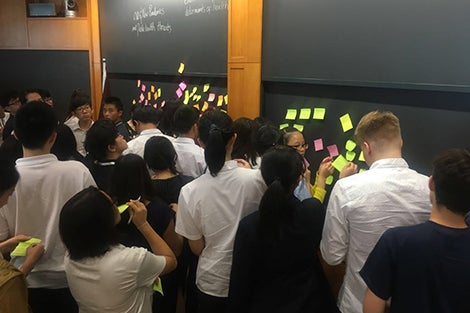September 14, 2016 – A group of 70 high school students from top Chinese high schools in Shanghai, Beijing, and other cities, learned about some of the hotly debated health issues in China—including air pollution, injuries, nutrition and cardiovascular disease—during a recent three-day interactive event in Shanghai led by faculty and postdocs from the Harvard T.H. Chan School of Public Health.
The students spent their time getting a crash course in key areas of public health—including epidemiology, statistical reasoning, environmental health, social and behavioral health, and health systems, policy, and management. The course used a combination of lectures, case studies, panel discussions, interactive games, and a “hackathon” to spark students’ interest in the field.
At the hackathon, on the symposium’s last day, students worked in small groups to brainstorm ideas for research or community projects pertaining to one of Harvard Chan School’s four major public health campaign themes—old and new pandemics, harmful physical and social environments, poverty and humanitarian crises, and failing health systems. After each group presented its research or intervention plan, the group voted for its favorite: a project aimed at reducing suicide by coaching people on the do’s and don’ts of talking with friends who are depressed.
In an exit survey, more than 83% of the students said they would be more likely to pursue public health as a career or education after attending the symposium. One called the event “mind-blowing and eye-opening.”
The Shanghai symposium was based on Harvard Chan School’s Public Health 101 nanocourse series—mini-courses in public health developed by the Postdoctoral Association (PDA) and offered at the School over the past few years.

The program was organized and led by Liming Liang, associate professor of statistical genetics at Harvard Chan School, in collaboration with the PDA and Felisa Nobles, director of recruitment at the Office of Diversity and Inclusion. Lead instructor for the symposium was Christian Suharlim, research associate in the Center for Health Decision Science and president of the PDA. Other instructors included Harvard Chan postdoctoral fellow Maria Korre and Harvard doctoral students Katherine Howe and Zhaozhong Zhu. Logistics and funding support for the event came from the Harvard Center Shanghai and from Capable Teens, an international nonprofit providing leadership training for young people.
Financial support was provided for some students whose families might not otherwise have been able to afford to send them to the symposium. Said Liang, “It is my vision to see more students, regardless of socioeconomic background, get early exposure to quality public health education.” He hopes to hold future Public Health 101 symposia in China and expand the program to other countries.
Said Suharlim, “It’s very humbling to see the passion and creativity these high school students bring to the discussion.”
photos courtesy Christian Suharlim
